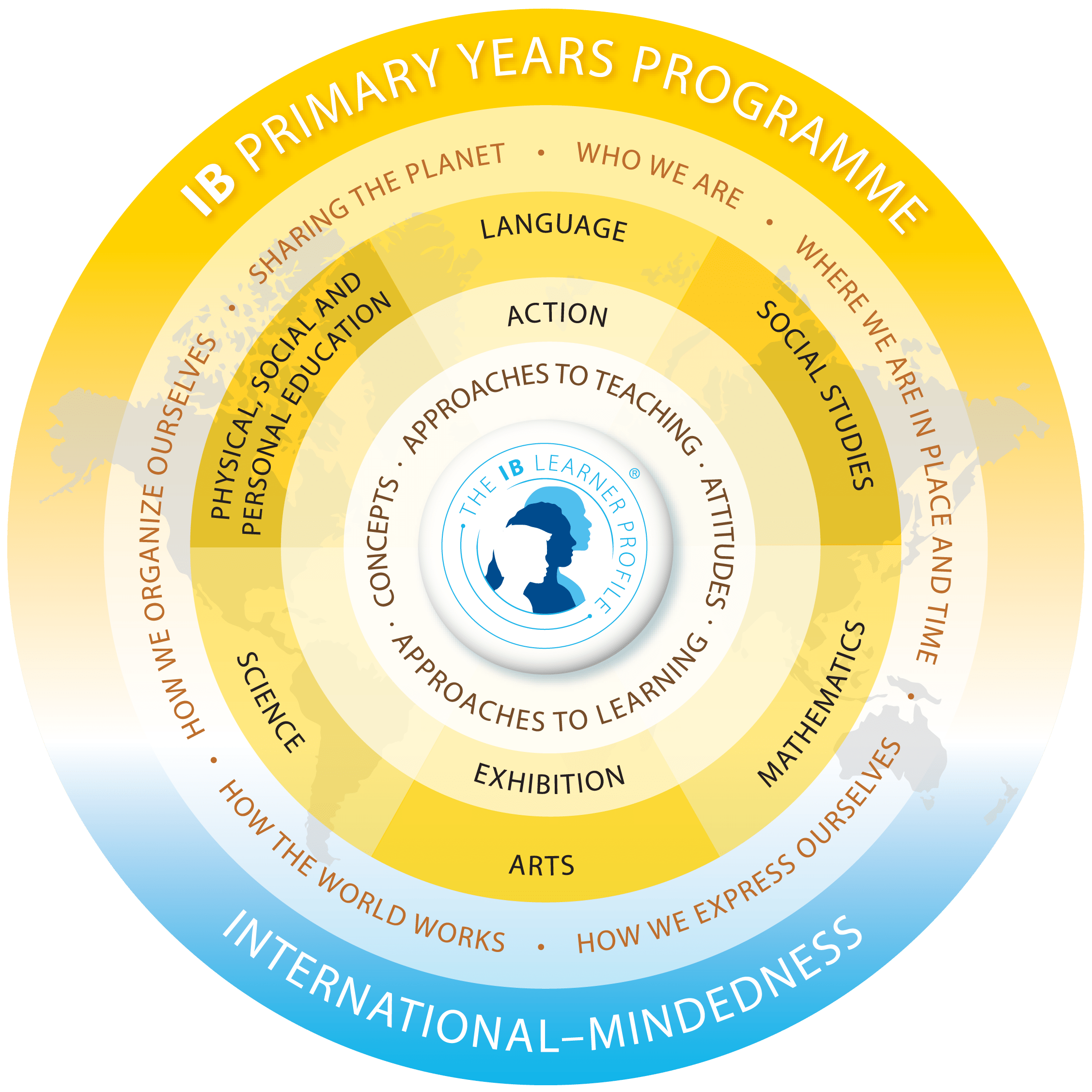What Is The Primary Years Programme?
“The PYP for children aged 3 – 12 nurtures and develops young students as caring, active participants in a lifelong journey of learning through a student-centered approach to education.”
– ibo.org
The Primary Years Programme (PYP) focuses on the development of the whole child as an inquirer, both in school and in the world beyond.
To meet the needs of the fast-paced and ever-changing world that our students will enter, we help them to develop a strong set of problem-solving strategies. We also develop their ability to think critically, as well as the knowledge and skills to apply to new and unfamiliar tasks.
PYP students learn how to take ownership of their learning. They learn to collaborate with others to deepen their understanding and increase their confidence and self-motivation.
Reflection and critical thinking is encouraged. Through actively engaging in integrated ongoing assessment, students become effective, self-regulated learners who can act on constructive feedback.
How Do Students Learn?
The Primary Years Programme supports transformative learning. Students learn by exploring transdisciplinary themes. They investigate concepts and questions which span multiple disciplines including mathematics, social studies, the arts, physical education, science, language and technology.
This enables students to develop their ability to learn and grow critically and through collaboration.
Through the PYP programme, our students are taught to:
- Become self-regulated, agentic learners
- Make personal connections to their learning and the learning of others
- Build upon their prior knowledge as they construct meaning
- Meaningfully reflect on their learning, setting goals that support their strengths and weaknesses as learners
- Seek out tools to support their development of a positive self-concept
- Show tolerance and respect for other cultures through our School’s special character, virtues and the Learner Profile
- Develop an international perspective
PYP students use seven key concepts, each underpinned by reflection, to delve deeper within and across learning areas. The key concepts include:
- form
- function
- causation
- perspective
- connection
- responsibility
- change
These concepts are supported by related concepts which can be content-specific and support the depth and breadth of knowledge students can gain through inquiry learning.
Programme Of Inquiry (POI)
Within the PYP, we develop a Programme Of Inquiry, a series of transdisciplinary themes of global significance. Students up to age 6 work through four inquiries annually and students from Year 2 to Year 8 work through each of the following six themes:
Our inquiry themes go both across and beyond subject areas. They are transdisciplinary, and this strengthens our students’ knowledge and understanding as they explore global, topical and relevant ‘big picture’ questions about the world around them.
The IB Learner Profile
The IB learner profile is at the heart of the PYP. The ultimate aim is for students to ‘become’ the learner profile.
The IB learner profile includes a list of 10 characteristics and attributes: risk-takers, reflective, principled, inquirers, knowledgable, thinkers, communicators, open-minded, caring and balanced.
We believe that developing these attributes helps our students to become responsible members of local, national and global communities.
At St Mark’s, we weave the learner profile into all areas of learning and celebrate the action we see stem from the attributes.
Our fortnightly ‘Caught in the Act’ school assemblies celebrate the learner profile attributes. This also helps to embed the language of PYP into all areas of our school life and is inclusive of all members of our learning community.
Action in the form of advocacy, social entrepreneurship, social justice, lifestyle choices and participation is encouraged within our units of inquiry as well as with our many other action and service learning initiatives.
PYP Exhibition
In Year 8, students conduct an extended, in-depth inquiry based on real-life issues or challenges. The inquiry is transdisciplinary and celebrates the culmination of a child’s PYP learning experience before they move on to college.
In recent years, our students’ Exhibition projects have included inquiries into Child Poverty, the economic impact of COVID-19 in Wellington, and gender equality in New Zealand.
In Term 3, students present their research, investigation and resulting action to the whole school community.
Recent research into the impact of the PYP exhibition found it to be a “valuable and pivotal experience in the life of the schools, families and students who were involved.”
Approaches To Learning
“Approaches To Learning” (ATL) are skills, strategies and attitudes which are designed to help students learn how to learn. Our approach is for teachers and students to work together to support self-regulated learning.
Approaches to Learning (ATL) are embedded implicity into our classroom culture. They develop and shape our students’ attitudes towards learning. This enables our students to work to co-construct knowledge with their peers and teachers. The students and teachers connect their approaches to learning with their approaches to teaching, to create and foster a social-constructivist environment.
The ATL are woven into the attributes of the Learner Profile and support learner agency, thus creating a rich, holistic and reflective learning experience. The skills our students develop provide a solid foundation for learning throughout their lives.








